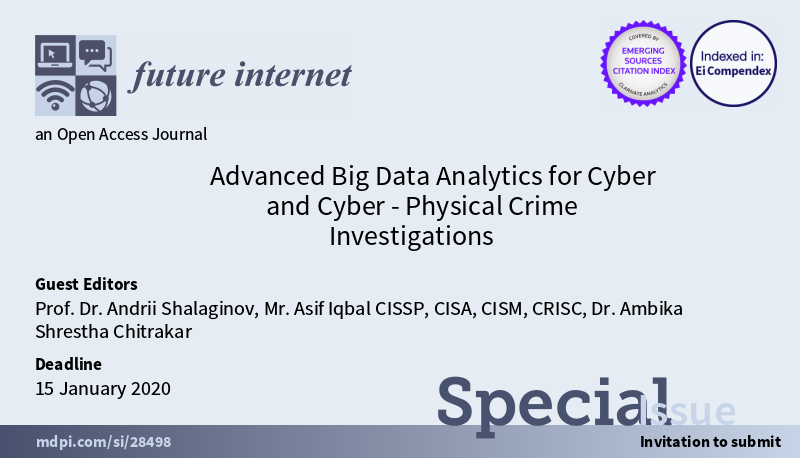Program of the Workshop 2019
Program of the workshop - 9th of December, 2019 (Updated 27.11.2019)
Program of the workshop - 9th of December, 2019 (Updated 27.11.2019)
Following the positive feedback and great interest last year, we are delighted to announce the 3rd International Workshop on Big Data Analytic for Cybercrime Investigation and Prevention, co-located with IEEE Big Data 2019 conference in Los Angeles, CA, USA on December 9-12, 2019.

The big data paradigm has become an inevitable aspect of today's digital forensics investigations. Acquiring a forensic copy of seized data mediums already takes several hours due to the increasing storage size. In addition are several other time-consuming laboratory analysis steps required, such as evidence identification, corresponding data preprocessing, analysis, linkage, and final reporting. These steps have to be repeated for every physical device examined in the criminal case. Conventional digital forensics data preprocessing and analysis methods struggle when handling the contemporary variety, variability, volume and velocity of case data. Thus, proactive approaches have to be developed and integrated in daily law enforcement operations; for timely detection and prevention of the illegal activities in a data-intensive environments. Thus, there is a need for advanced big data analytics to aid in cyber crime investigations, which requires novel approaches for automated analysis. This workshop is organized to bring together recent development in big data analysis to aid in current challenges in cybercrime investigations.
The topics of the workshop are as following, but not limited to:
Algorithm areas
- Machine Learning-aided analysis
- Improvements of existing methods
- Digital Forensics data simulation
- New data formats and taxonomies
- Secure collaborative platforms
- Distributed storage and processing
Oct 23 (extended from Sep 20), 2019: Due date for full workshop paper submissions
Nov 10 (extended from Oct 15), 2019: Notification of paper acceptance to authors
Nov 20 (extended from Nov 10), 2019: Latest due date for camera-ready of accepted papers
Dec 9-12, 2019: Workshops and conference

Postdoctoral Researcher in Digital Forensics, andrii.shalaginov@ntnu.no

PhD Research Fellow in Information Security, jan.w.johnson@ntnu.no

PhD Research Fellow in Information Security, ambika.chitrakar2@ntnu.no

PhD Research Fellow in Digital Forensics, CISSP, CISA, CISM, Founder & CEO Athena Labs, asif.iqbal@ee.kth.se
Ali Dehghantanha (University of Guelph)
Bing Zhou (Sam Houston State University)
Hanno Langweg (Konstanz University of Applied Sciences)
Dmitry Kangin (University of Exeter)
Igor Kotsiuba (Pukhov Institute for modeling in Energy Engineering)
Inna Skarga-Bandurova (East Ukrainian National University)
Junaid Arshad (University of West London)
Mamoun Alazab (Charles Darwin University)
Neminath Hubballi (Indian Institute of Technology Indore)
Olaf M. Maennel (Tallinn University of Technology)
Shih-Chieh Su (Microsoft)
Vasileios Mavroeidis (University of Oslo)

PhD, Chief Engineer EU projects Pukhov Institute for Modelling in Energy Engineering National Academy Of Sciences of Ukraine
The authors are invited to submit: full-length papers (up to 10 pages IEEE 2-column format), short papers (4-6 pages IEEE 2-column format) or abstract papers (up to 4 page IEEE 2-column format) through the online submission system. Page count includes references, figures and tables.
Papers should be formatted to IEEE Computer Society Proceedings Manuscript Formatting Guidelines (see link to "formatting instructions" below) using Letter page format (8.5" x 11").
LaTex Formatting Macros or DOC
The authors of accepted papers must guarantee their presence at the conference for the papers to be published in the conference proceedings. At least one author of each accepted paper must register for the conference in order to include the paper in the proceedings.
Moreover, selected papers are nominated for submission to “Special Issue on Advanced Big Data Analytics for Cyber and Cyber-Physical Crime Investigations", international scientific journal of Future Internet (ISSN 1999-5903), published online by MDPI, which Indexed in Ei Compendex, Scopus and the Emerging Sources Citation Index (ESCI - Web of Science). Extended papers should have at least 60% of new material and will be sent through a review process to ensure the quality of contributions. More about the Special Issue

The Best Paper Award is given to the best paper at the workshop. All participants who submitted a paper automatically qualify to enter, and the winner will receive 500 CHF.